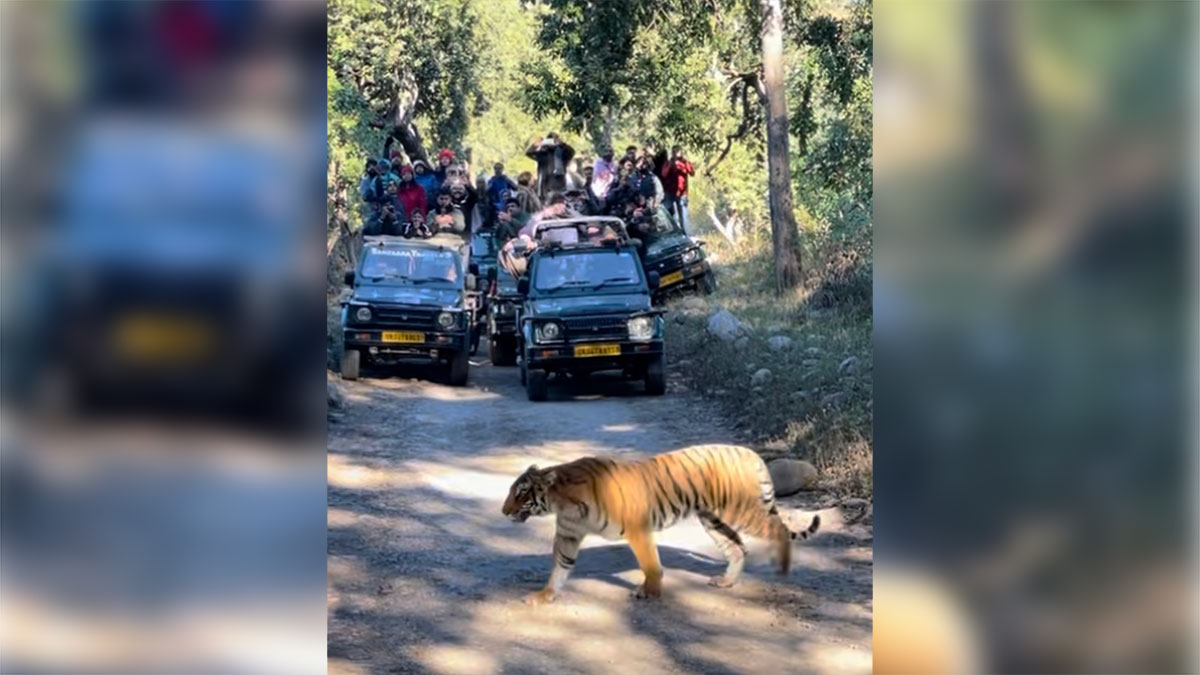Shachi Rao
This isn’t a groundbreaking article promising new insights into human behaviour — just a confused and sorrowful observation. In the annals of human history, ever since language came into being, words have waltzed out, eulogising the love and devotion of mothers. But do we extend the same courtesy to animal mothers? This reflection is drawn from something I witnessed in Jim Corbett National Park — a quiet yet profound encounter with a mother’s helplessness, her unwavering duty, and her fierce love for her offspring. It became an unexpected drama, and she, a reluctant protagonist — cast unwillingly into a scene shaped by human insensitivity.
As a wildlife enthusiast, I joined an early morning safari — as did many others, some genuinely curious, others seeking a post-worthy moment for social media. Our guide, Sanjay — seasoned and deeply respectful of the forest — reminded us of the jungle’s code: Maintain silence. Don’t disturb nature. Don’t feed or touch the animals. “This is their home,” he said. “Be a respectful guest.” It was still dark when we entered the forest. The air — crisp, clean, and fragrant with the scent of trees — revived us. A forest offers a rare experience: vibrant, yet meditative.
As we moved deeper, Sanjay stopped the vehicle. He had heard something. Far away, nestled under a tree, were two tiger cubs — tiny, striped, magical. As we marvelled at their beauty, I wondered aloud where their mother was. “She’s nearby,” he said softly. And indeed, she was — hidden in the thicket across the road, watching silently.
But news of tiger sightings spreads fast in the jungle. In no time, vehicles swarmed the area. Engines revved, voices rose, and the road became a barricade of restless jeeps and chattering tourists. The mother, still concealed, grew increasingly agitated. She needed to cross the road to reach her cubs — but humans had blocked her path. Sanjay politely requested others to reverse and make way. His words were ignored — drowned by the excitement of overzealous guides and thrill-seeking visitors. Finally, he raised his voice, sharp with urgency: “Give way to the mother! She’s desperate to reach her babies. She may attack if she’s pushed further!” Silence fell. The vehicles slowly moved back. We waited. And then she emerged.
A magnificent tigress stepped out of the bushes, barely ten feet from our jeep. Every muscle in her body was alert, her eyes scanning left and right — wary, bewildered by our presence. Yet her resolve never faltered. She walked forward, cautious but determined, cutting across the road with quiet dignity. The cubs, who had inched closer, camouflaged by the jungle, came bouncing toward her. Her tense expression softened as she bent to lick them — a mother reunited. Then, suddenly, she turned
With a fiery gaze and a mighty roar, she looked straight at us. Not in fear — but in reprimand. It felt as if she was scolding us — for our insensitivity, our arrogance, our inability to understand the simplest of truths: that love, fear, and devotion are not uniquely human emotions. We, who place ourselves at the top of the hierarchy — the “most civilised” species — so often forget how to behave. We call other animals beasts, yet our actions betray the real meaning of that word.
A forest is not an adventure park. It is a sanctuary — not ours, but theirs. And when we step into that space, we must do so with reverence, humility, and restraint. Let this be a reminder. Let this be a pledge: To be responsible and respectful visitors in the realm of wild beings. To remember — a mother is a mother, no matter the species.















Leave a comment